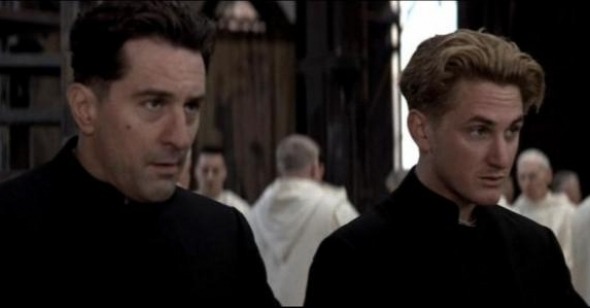The Odd Couple
Jeff Reichert on We're No Angels and Not I
The limits to which it is possible to define an artist always press most strongly in these symposium exercises wherein we attempt to discuss the entirety of a body of work. We at Reverse Shot have circumvented the most obvious pitfall by fracturing our perspective into a multiplicity of voices, but does this introduction of a group of writers really bring us that much closer to a definitive statement, if, indeed, that’s what we’re after? Does a definitive statement even jibe with our strategy of splintering? And, in the curious case of Neil Jordan, is a definitive statement possible at all? Here we find a filmmaker, even more than that greatest polymath we’ve examined up to this point, Richard Linklater, whose filmography is comprised almost solely of oddities, dead-ends, unlikely masterpieces, and even less likely genre forays. Yet somehow, a relative travesty like In Dreams feels no less his than Breakfast on Pluto, and even his largest, most impersonal film, Michael Collins, still traces lines that links it back to other works. Perhaps no two of his films better embody the poles evident in his career than his most and least conventional: his Depression-era priest comedy We’re No Angels with Robert DeNiro and Sean Penn and his short Not I, a contribution to the Beckett on Film program starring Julianne Moore.
Somewhat unfairly maligned, We’re No Angels, Jordan’s first movie shot in North America, continues the retreat from the decidedly offbeat pleasures of his early films represented by High Spirits and deepens the young-ish filmmaker’s immersion in more artisanal concerns: production design and atmospherics seem more considered here than plot or character which leaves the film on somewhat shaky grounds. Not quite as clunky (though almost) as its detractors suggest, We’re No Angels feels like an idea Preston Sturges might have sketched out on spec and cast aside (and perhaps it might have been—Michael Curtiz directed the similarly plotted original of the same name in 1955): two convicts on the run assume the identities of traveling monks and hide out in a nearby monastery where they plot to escape across the nearby Canadian border. Hijinks, and salvation, ensue. The creaky narrative mechanics surely came as a shock to a late Eighties audience used to the machine-tooled. This more nostalgic (to be charitable) bent coupled with the near-soundstage look and feel of the thing must have seemed of another time in a year where audiences flocked to Ridley Scott’s Black Rain. It’s not unlike the studio-era recuperation project undertaken by the Coen Brothers in O Brother Where Art Thou?, except far more spiritually earnest where the Coens settled for arch and intolerable.
Where We’re No Angels attempts to hew closely to rules of filmmaking established by his forbearers, Not I’s radical aesthetic shrugs them off entirely. Beckett’s play consists only of “Mouth,” a woman in shadow upstage with her lips spotlit, and downstage a hooded “Auditor” character who remains speechless throughout. From Mouth comes a fractured narrative of childbirth, love, denial, poverty, and loss that catapults to the audience in short jabs of evocative phrasing (“no love…spared that…speechless all her days…practically speechless”) that dance around the narrated events in a babbling inarticulacy well matched for Jordan—he employs the visual equivalent of the same for better (The Company of Wolves, The End of the Affair) and for worse (In Dreams). Aside from a shot of Mouth (Julianne Moore) seating herself, the rest of the short is comprised of close-ups of her lips from the front and both profiles. It’s a disorienting effect, each cut poking at one’s ability to comprehend the stream of verbiage no less than the sheer opacity of the words themselves. Having not seen the play performed, I can only guess, but it seems that something in Jordan’s method here may have actually improved upon the effects available to Beckett on the stage.
Conclusions to be drawn from this little exercise? Few, I suppose. The two works offer little room for a detailed comparison—truly apples and oranges as they are. However, that there’s space for them both within the peculiar oeuvre of a single filmmaker is testament to Jordan’s restless energies as a filmmaker. In his body of work both are far cries from seminal texts yet remain illuminating in their own right. We’re No Angels represents the first flowering of solid sense-of-place craftsmanship which would help ground works like The Butcher Boy and The End of the Affair, where the mode of discourse perhaps rests closer to Beckett’s Not I on a relative scale. Appropriately enough, that they exist together in the same article is due solely to our own restless, schizophrenic tendencies, which perhaps explains why we (hubris here: and Jordan) continue pushing and evolving our own idiosyncratic paths
